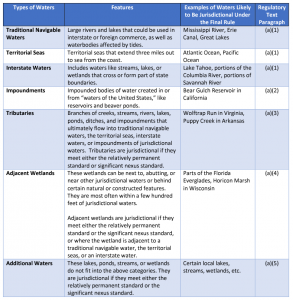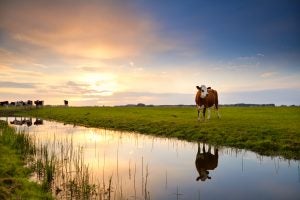If you are a boater, an angler, or any sort of water enthusiast, you surely have seen how public waters are regulated. With the vast amount of bodies of water in the United States, it’s easy to be left wondering which ones can be regulated by the government and which ones can’t?
In 1972, Congress passed the Clean Water Act — the same act that established the term Concentrated Animal Feeding Operation (CAFO) — in an attempt to keep the waters of the United States clean and safe for travel, consumption, and recreation. The Clean Water Act gives the U.S. Environmental Protection Agency and the U.S. Army Corps of Engineers the authority to declare if individual bodies of water as able to be regulated or not — regulated bodies of water are considered a water of the United States (WOTUS) and are subject to regulation.
The term “waters of the United States” seems to imply that any body of water from Lake Erie to the puddle in your driveway is able to be regulated, but that would be crazy. The definition of WOTUS has been questioned in court a few times since 1972, which had led to WOTUS meaning that basically any water that contributes to commerce in and out of the U.S. are considered WOTUS.
There are various types of waters under this umbrella, including traditional navigable waters such as rivers and lakes, territorial seas, interstate waters (which are streams and lakes that cross state lines), impoundments such as reservoirs, tributaries, adjacent wetlands such as the everglades or marshes, and a few additional waters.

In December 2022, the definition of WOTUS changed, and not in a favorable way for agricultural producers.
Farmers are one of the groups most affected by polluted and mistreated waterways, and farmers are also subject to a lot of regulation and scrutiny when it comes to waterways already, which has been exacerbated by the new WOTUS rules that were set in place on December 30, 2022. The problem is so apparent that a few weeks after the new law was put in motion, several agricultural groups united to file a lawsuit against the EPA.
The definition of WOTUS and what can be regulated has changed a few times over the years because of different court cases; these amendments drew clearer lines between what was a WOTUS and what wasn’t. But the EPA feels that the amendments have not had positive effects on the waterways in the U.S. and decided it was time to crack down.
Congress essentially decided to throw out amendments made to the Clean Water Act in 2015, 2019, and 2020, and revert to the pre-2015 rules. The problem with that is that the pre-2015 rules were very ambiguous, specifically when talking about “additional waters.”
Bodies of water that don’t fit into the defined categories can be considered “additional waters” and be defined as a WOTUS if they pass one of two tests.
- The first test is of relative permanence. If a body if water is relatively permanent, standing, or continuously flowing and connected to a WOTUS, then that is an additional water that is a WOTUS.
- The second test is the significant nexus test, which asks the question of how important is this body of water to the body of water it is connected to? Just like main roads get paved or plowed of snow before the back roads do, more importance is placed on bodies of water that impact society the most.
But how is a body of water determined to be relatively permanent or of significant nexus? That seems to be for the EPA to know and us to find out with a hefty fine in the mail.

The problem with the new WOTUS rules is that they are ambiguous, and may require farmers to hire people from the EPA or Army Corps of Engineers to examine waterways on their property. For example, farmers who own thousands of acres of land could spend a whole month tromping through woods helping an Army engineer get to all the possible WOTUS locations on the land.
The new WOTUS rules don’t come without hefty fines for non-compliance. Because of these fines and the ambiguity of how “additional waters” are defined, farmers are going to be facing scrutiny for previously unimportant matters.
While we should all be in favor of keeping our waterways clean and healthy, we also should be able to have a peace of mind knowing what rules we need to follow, and frankly the new WOTUS regulations are too ambiguous for farmers to be comfortable with.
The American Farm Bureau Federation has put out a statement that it is not in favor of the new WOTUS rules, and you can read more about Farm Bureau’s thoughts in an article the organization published, pleading with Congress not to pass the December 2022 amendment.
Elizabeth Maslyn is a born-and-raised dairy farmer from Upstate New York. Her passion for agriculture has driven her to share the stories of farmers with all consumers, and promote agriculture in everything she does. She works hard to increase food literacy in her community, and wants to share the stories of her local farmers.



